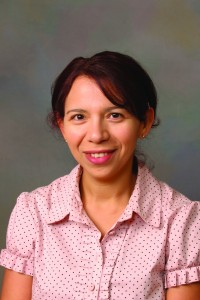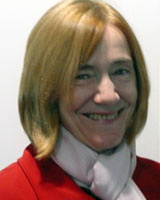Profiles And Contributions To This Article
Managing chronic diseases in rural aged care facilities using point-of-care testing systems

qualifications: PhD
contribution: original concept, wrote the first draft
position: Director, Senior lecturer/Pharmacist academic
 Australia
Australia
Chronic disease management and evidence based health care

qualifications: MSc
contribution: contributed to drafts
position: Research assistant
 Australia
Australia
Health Scientist / Project Officer / Researcher Community Point of Care Services Flinders University Rural Clinical School, Adelaide, SA Currently part of Quality Assurance for Aboriginal Medical Services Management Team - QAAMS (Director Mark Shephard) Special Interest: Indigenous Health Qualifications : Master of Science (Clinical Biochemistry) Master of Social Science (Counselling)

qualifications: BSc, DipEd
contribution: supplied data, contributed to drafts
position: Research officer/Data manager
 Australia
Australia
Research on mobile wound care, transfer of evidence based research, RURAL health

qualifications: PhD, FACE
contribution: supplied data, contributed to drafts
position: Professor & Head of the School
 Australia
Australia
Professor Judi Walker holds the inaugural Chair of Rural Health at the University of Tasmania, recognising the significant contribution she has made to the development of academic rural health in Australia. Her background and achievements exemplify the interdisciplinary and multiprofessional nature of rural health. Judi has overall responsibility for the Faculty of Health Science's rural health portfolio. She is Chief Executive of the University's Rural Clinical School - a conjoint appointment with the Tasmanian Department of Health and Human Services. Judi has an international reputation for practice and research in rural medical/health professional education, interdisciplinary education,innovation in health service delivery and education and training for health workforce reform. She leads a research team looking at health care models and policy approaches for rural older people. Judi has a longstanding engagement with paramedic education and is a member of the national Ambulance Education Council. In 2005 she completed a significant consultancy for the Council of Ambulance Authorities and developed Australia's national accreditation system for university paramedic programs.

qualifications: PhD, OAM
contribution: supplied data, contributed to drafts
position: Professor & Director
 Australia
Australia
Professor Mark Shephard OAM, BSc (Hons), MSc, MAIMS, MAACB, FFSc (RCPA), PhD is Director of the Flinders University International Centre for Point-of-Care Testing. He is Program Manager of the international ACE (Analytical and Clinical Excellence) Point-of-Care Testing Program for diabetes management which is now operating in 7 countries, and is the Course Co-ordinator for the Centre's Graduate Certificate in Global Point-of-Care Testing, which is the first postgraduate academic qualification in the field of point-of-care testing. Within Australia, Mark is Program Manager of the largest national point-of-care testing field network, called QAAMS (Quality Assurance for Aboriginal and Torres Strait Islander Medical Services), which delivers point-of-care testing for diabetes management in over 175 Aboriginal medical services. He is also Chair of the Management Committee of the Northern Territory Point-of-Care Testing Program, in which point-of-care testing for acute and chronic diseases is conducted in 35 remote health centres in the Territory. Mark is a Chief Investigator on a National Health and Medical Research Council (NHMRC)-funded randomised trial of point-of-care testing for chlamydia and gonorrhoea in remote Australian Aboriginal communities called TTANGO (Test, Treat and Go). Mark was one of seven Chief Investigators of the Centre of Clinical Research Excellence (CCRE) for Aboriginal and Torres Strait Islander Health (2003-2008). His unit was also one of the three lead organisations charged with the delivery of the Australian Government's Point-of-Care Testing in General Practice Trial, which involved 53 general practices and just under 5000 patients with chronic disease (2005-2007). Mark has the unique dual honour of being the recipient of (i) the Medal of the Order of Australia (OAM) in the 2006 Queen's Birthday Australian honours list and (ii) an Australian of the Year Award in 2004. These awards primarily acknowledged Mark's work in Point-of-Care Testing. In 2009, Mark was the recipient of a Distinguished Alumni Award from Flinders University, which recognised his significant contributions to the improvement of Aboriginal health in Australia and his services to the University. In 2011, Mark was elected as a Founding Fellow of the Royal College of Pathologists of Australasia's (RCPA) Faculty of Science. Mark has also served as Chair of the Australasian Association of Clinical Biochemists (AACB) Point of Care Testing Working Party (2004-5). Since 2010, he has been Co-Chair of the Australian Institute of Medical Scientists (AIMS) Working Committee on Point-of-Care Testing for Infectious Disease and Drugs of Abuse. In 2013 Mark was appointed Chair of the WONCA (World Organisation of Family Doctors) Special Interest Group on Global Point-of-Care Testing.
Search
Register Now
News & Events
Factors associated with low birth weight in Indonesia
article
WONCA East Mediterranean Region Conference 2025, 8 –10 May 2025, Tangier, Morocco
web link
4th International Indigenous Health and Wellbeing Conference 2025, 16–19 June 2025, Kaurna Country, Adelaide, Australia
web link
CATSINaM Regional Congress 2025, 2–4 July 2025, Kaurareg Country, Waibene (Thursday Island)
web link
2025 Gayaa Dhuwi Conference, 28–29 August 2025, Garramilla (Darwin), Australia
web link
National Tribal Health Conference, 7–12 September 2025, Chandler, AZ, USA
web link
2025 National First Nations Mental Health & Suicide Prevention Conference, 15–17 September 2025, Gold Coast, Australia
web link
10th Rural & Remote Health Scientific Symposium, 8 & 9 October 2025, Alice Springs, NT, Australia
web link
Indigenous Wellbeing Conference 2025, 20–21 October 2025, Meanjin (Brisbane), Australia
web link
World Indigenous Suicide Prevention Conference 2026, 17–19 September 2026, Kirikiriroa (Hamilton), New Zealand
web link
9th European Young Family Doctors' Movement (EYFDM Forum), 25–27 April 2025, Grande Région
web link
WONCA Asia Pacific Region Conference 2025: Primary Care Transformation; Implementing High-value, High-quality Care!, 24–27 April 2025, Busan Korea
web link
Hauora Taiwhenua Rural Health Network's National Rural Health Conference, 1–3 May 2025, Ōtautahi | Christchurch, Aotearoa New Zealand
web link
The Global Advanced Practice Summit: Improving Healthcare and Building Global Collaboration, 13 May 2025, online
web link
NRHA 30th Health Equity Conference, 19–20 May 2025, Atlanta, GA, USA
web link
NRHA 48th Annual Rural Health Conference, 20–23 May 2025, Atlanta, GA, USA
web link
2025 International Rural Nursing Conference, 27–30 May 2025, Arlington, TX, USA
web link
BC Rural Health Conference 2025, 6–8 June 2025, Prince George, BC, Canada
web link
4th International Indigenous Health & Wellbeing Conference 2025, 16–19 June 2025, Adelaide Convention Centre, Kaurna Country, Australia
web link
14th EURIPA Rural Health Forum. Rural Reformation: Meeting Wellbeing and Healthcare Needs in Rural Communities, 26–28 June 2025, Saxony-Anhalt, Germany
web link
Rethinking Remote 2025: Scotland's Rural Health Conference
web link
16th National Allied Health Conference: Empowering lives, shaping healthcare, 11–14 August 2025, Adelaide, Australia
web link
WONCA World Conference 2025: New Vision for Primary Health Care and Sustainable Development, 17–21 September 2025, Lisbon, Portugal
web link
NRHA 23rd Rural Health Clinic Conference, 23–24 September 2025, Kansas, MO, USA
web link
2025 Health Leadership Congress, 22–24 October 2025, Darwin, Australia
web link
Rural Mental Health Conference 2025 (RMHC25), 5–7 November 2025, Hobart, Tasmania, Australia
web link
4th EURACT Medical Education Conference, 23–25 April 2026, Iasi, Romania
web link
9th WONCA Africa Region Conference 2026, 10 & 11 September 2026, Gaborone, Botswana
web link
18th National Rural Health Conference, 14–17 September 2026, Adelaide, SA, Australia